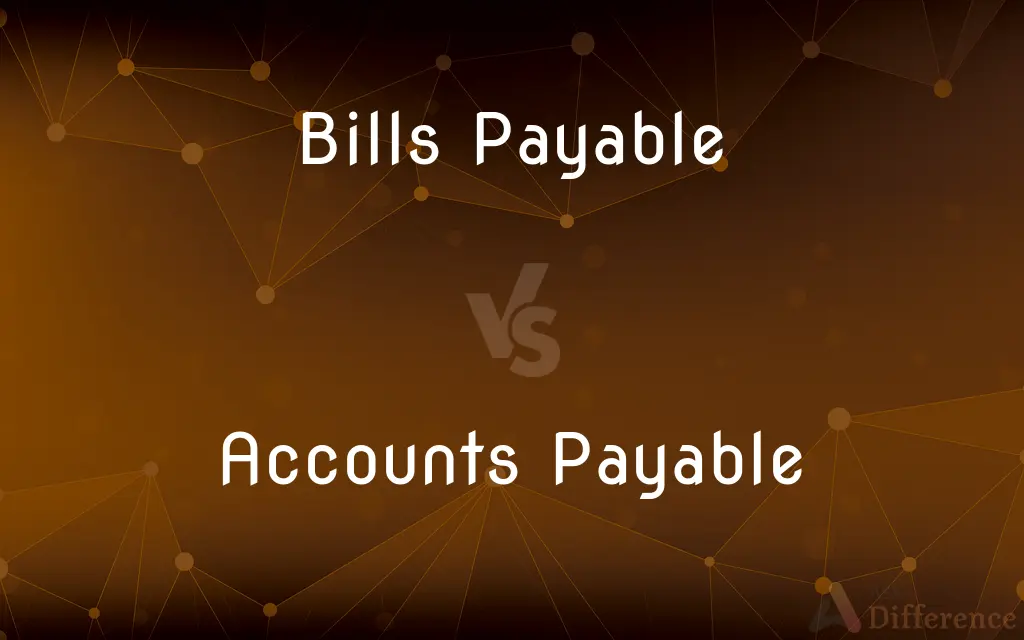Bills Payable vs. Accounts Payable — What's the Difference?
By Tayyaba Rehman — Published on October 11, 2023
Bills Payable refers to specific invoices from vendors that a company must pay, while Accounts Payable encompasses all of a company's short-term liabilities to be paid to vendors.

Difference Between Bills Payable and Accounts Payable
Table of Contents
ADVERTISEMENT
Key Differences
When managing corporate finances, it is pivotal to understand the nuances of Bills Payable and Accounts Payable, two key components of a firm’s liabilities. Bills Payable refers to the specific bills or invoices which a company has received from suppliers and has an obligation to pay in the near future. Accounts Payable, on the other hand, represents a company’s total short-term obligations to pay off suppliers and creditors, which could encompass a multitude of bills, including those categorized as Bills Payable.
One crucial difference between Bills Payable and Accounts Payable hinges on specificity and generalization. Bills Payable are specified, itemized documents that highlight the exact amount due, often coming with specified terms of payment, and can sometimes be legally binding instruments. Accounts Payable does not pertain to specific bills; instead, it represents a generalized total of all amounts due to suppliers, without being tied to individual invoices or bills.
Bills Payable can be envisaged as a subset within the larger financial scope that is Accounts Payable. Bills Payable are specific liabilities, often documented through instruments such as promissory notes, that provide explicit details on the amount due, the creditor, and the terms of repayment. Whereas, Accounts Payable serves as a broader term, encompassing all outstanding bills payable but also other short-term obligations to creditors that may not be represented by a specific bill or invoice.
The roles they play in financial reporting and day-to-day transaction management also diverge significantly. Bills Payable, due to their specific nature, are managed and tracked individually to ensure timely payment and to uphold contractual obligations. Accounts Payable, as a wider concept, requires maintaining a ledger that captures all short-term liabilities to vendors, with an ongoing need for reconciliation to ensure that all outstanding debts are acknowledged and ultimately settled.
In cash flow management, the segregation of Bills Payable and Accounts Payable allows companies to prioritize payments and manage their short-term liquidity efficiently. Bills Payable typically have stricter and more legally bound repayment terms, demanding precise tracking and timely settlement. Accounts Payable, in a comprehensive sense, needs strategic management to optimize cash flows, ensuring the sustenance of healthy business relationships with suppliers and creditors by honoring obligations while also preserving operational liquidity.
ADVERTISEMENT
Comparison Chart
Specificity
Pertains to specific invoices
Encompasses all short-term debts
Documentation
Often has legal documents
Not always documented
Management Focus
Individual bill tracking
Ledger maintaining
Legal Binding
Sometimes legally binding
Generally not
Scope
Narrower scope
Broader scope
Compare with Definitions
Bills Payable
Specific payment obligations towards vendors.
Bills Payable were settled to avoid any late fees.
Accounts Payable
The total amount owed to suppliers and vendors.
The Accounts Payable increased following the large inventory purchase.
Bills Payable
Formal instruments indicating a payable amount.
Bills Payable served as legal evidence of the debt owed by the company.
Accounts Payable
A record of all unpaid vendor invoices.
The ledger reflected an uptick in Accounts Payable after the festive season.
Bills Payable
Individual, documented obligations to creditors.
The CFO scrutinized all Bills Payable to manage cash flows.
Accounts Payable
A ledger account summarizing short-term liabilities.
The Accounts Payable was checked to assess upcoming payments.
Bills Payable
Notes evidencing a debt amount and payment terms.
Bills Payable were meticulously recorded for accurate liability tracking.
Accounts Payable
Collective short-term obligations of a business.
Accounts Payable was scrutinized during the financial audit.
Bills Payable
Liabilities documented with specific instruments.
The company issued Bills Payable to obtain office supplies.
Accounts Payable
Liabilities reflecting unpaid vendor bills.
A rise in Accounts Payable indicated enhanced purchase activities.
Common Curiosities
What are Bills Payable?
Bills Payable are specific invoices or bills that a company has received and must pay in the future.
What type of account is Accounts Payable?
Accounts Payable is a liability account, reflecting amounts owed to vendors.
Are Bills Payable included in Accounts Payable?
Yes, Bills Payable are typically included within the broader category of Accounts Payable.
What is the impact of paying Bills Payable on cash flow?
Paying Bills Payable reduces the company's cash or bank balance and decreases the liabilities.
What encompasses Accounts Payable?
Accounts Payable represents all of a company's short-term debts or obligations to vendors and creditors.
Can Bills Payable be legally binding?
Yes, Bills Payable, like promissory notes, can sometimes be legally binding documents.
How is Accounts Payable managed?
Accounts Payable is managed by maintaining a ledger, tracking, and paying invoices, and reconciling balances.
Can Bills Payable include interest terms?
Yes, Bills Payable may specify interest terms for late payment.
Is Accounts Payable specific to individual transactions?
No, Accounts Payable is a collective account, not tied to specific transaction documents.
Share Your Discovery

Previous Comparison
Gag vs. Puke
Next Comparison
Final Dividend vs. Proposed DividendAuthor Spotlight
Written by
Tayyaba RehmanTayyaba Rehman is a distinguished writer, currently serving as a primary contributor to askdifference.com. As a researcher in semantics and etymology, Tayyaba's passion for the complexity of languages and their distinctions has found a perfect home on the platform. Tayyaba delves into the intricacies of language, distinguishing between commonly confused words and phrases, thereby providing clarity for readers worldwide.
















































